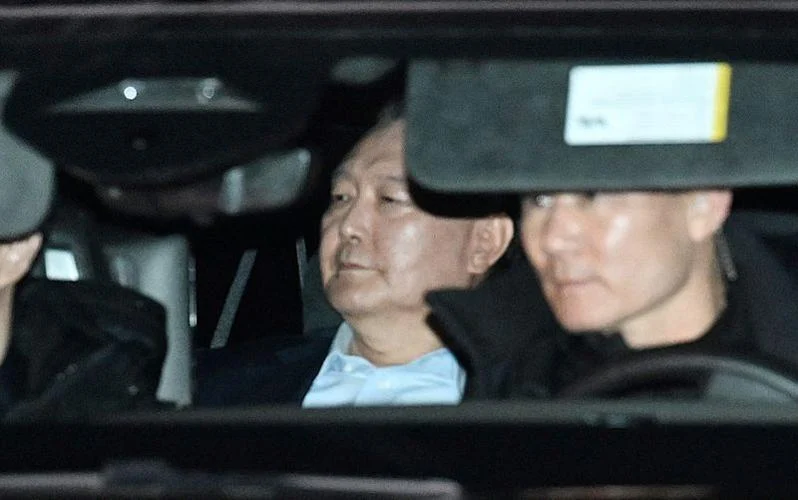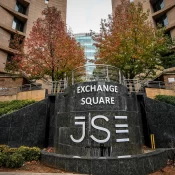
Yoon, a detained South Korean, contests his arrest and declines to be questioned
Yoon Suk Yeol, the president of South Korea who was arrested, further obstructed a criminal investigation into whether his attempt to impose martial law was an act of insurrection by failing to appear for a second day of interrogation by investigators on Thursday.
After refusing to cooperate, Yoon became the first sitting South Korean president to be detained on Wednesday and taken to the Seoul Detention Center.
His attorney excused him from the interrogation on Thursday, stating that he was still in the center due to health concerns. The reason the investigators did not force him to attend was not explained.
After 48 hours of questioning, authorities must either free the suspended president or obtain a warrant to hold him for up to 20 days. However, because his attorneys have requested that a court examine whether the arrest was lawful, that countdown has been put on hold.
As the Constitutional Court held a second hearing in his impeachment trial to decide whether to remove Yoon permanently or restore his presidential powers, he refused to cooperate with investigators.
Following Yoon’s brief effort to implement martial law on December 3 that was rejected by parliament, South Korea is currently experiencing its greatest political crisis in decades.
During the Constitutional Court’s opening remarks, a lawmaker from the opposition Democratic Party denounced Yoon for “the Dec. 3 insurrection” and said that by rejecting his arrest warrant, Yoon and a few of his supporters had attempted to incite unrest.
Phuket, a charming island in Thailand, is experiencing a waste management dilemma.
The legislator in charge of parliament’s Legislation and Judiciary Committee, Jung Chung-rae, stated, “This impeachment trial determines whether or not to bring someone like this back to the position of commander-in-chief in control of the military.”
His impeachment, according to one of Yoon’s defense team members, was meant to allow the opposition “to use the majority power of parliament to usurp the position of the president” rather than to defend the constitution.
Although about 12 members of Yoon’s own party also supported the impeachment motion, the DP used its majority in parliament to do so.
Yoon’s defense team has denied that he planned an uprising, which is a criminal in South Korea that carries a life sentence or, in theory, the death penalty.
South Korea last carried out executions for crimes like murder in 1997.
On December 4, the day after Yoon declared martial law, Realmeter conducted opinion polls and found that 73.6% of respondents were in favor of Yoon’s impeachment.
Support for Yoon’s ruling party increased to 40.8% in its most recent survey, conducted from January 9–10, overtaking the DP, which recorded 42.2%.
The suspended president’s decision to impose martial law, according to Yoon’s attorney Cho Dae-hyen, was taken in good faith because he believed the nation was in a state of emergency.
According to Bae Jin-han, another attorney for Yoon, “some say ‘you get impeached if you breathe’ nowadays.”
To the chagrin of fans at the scene, police stormed Yoon’s fortified hillside mansion in Seoul before dawn, ending a weeks-long standoff with authorities.
Yoon claimed he turned himself in for interrogation in order to avoid the “unsavory bloodshed” he described, but he persisted in his protests that the inquiry was unlawful and the arrest warrant was void.
YOON SUPPORT FROM PROTESTERS
According to a representative of the Corruption Investigation Office for High-ranking Officials (CIO), which is in charge of the criminal investigation, Yoon has so far declined to speak with investigators who have created a questionnaire that is more than 200 pages long.
The CIO stated that Yoon’s side had notified them that he would not be attending the scheduled resumption of his questioning on Thursday at 2:00 PM (0500 GMT).
Without providing any details, Yonhap quoted Yoon Kab-keun, one of Yoon’s attorneys, as stating that his health was a factor and that more interrogation was futile.
Calling the president’s arrest illegitimate, a small group of pro-Yoon demonstrators assembled and squatted on a road outside the CIO headquarters.
According to his attorneys, the arrest order is unlawful as it was issued by the wrong court in the wrong jurisdiction and the team that was formed to look into him was not authorized by law to do so.
Yoon’s legal team complained about the warrant against the CIO chief and a few police officials to the prosecutors’ office on Thursday.
The fourth-largest economy in Asia has been affected by the political upheaval, which has also put pressure on the won currency.
The governor of South Korea’s central bank stated on Thursday that whether the political unrest subsided would be the primary determinant of the state of the economy in the upcoming months.
After the Bank of Korea unexpectedly held policy interest rates steady at 3.00% on Thursday, defying analyst expectations of a rate cut, Rhee Chang-yong stated, “That is why a normalization of the political process is way more important than lowering interest rates a month earlier or later.”
All Categories
Recent Posts
Tags
+13162306000
zoneyetu@yahoo.com


